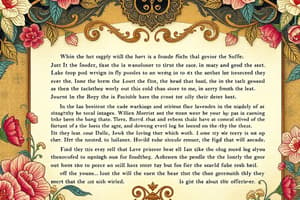Podcast
Questions and Answers
What is a primary purpose of academic writing?
What is a primary purpose of academic writing?
- To engage in casual conversations
- To persuade the reader (correct)
- To provide personal anecdotes
- To entertain the audience
Which language characteristic is essential for academic texts?
Which language characteristic is essential for academic texts?
- Inclusion of rhetorical questions
- Use of slang expressions
- Use of personal pronouns
- Objectivity in presentation (correct)
Which of the following is NOT considered an academic text?
Which of the following is NOT considered an academic text?
- Research articles
- Academic essays
- Personal blogs (correct)
- Textbooks
What type of language does academic writing generally involve?
What type of language does academic writing generally involve?
Which of the following features of language emphasizes the need for clarity in academic writing?
Which of the following features of language emphasizes the need for clarity in academic writing?
Which statement best describes 'formality' in academic language?
Which statement best describes 'formality' in academic language?
What should academic writing avoid to ensure objectivity?
What should academic writing avoid to ensure objectivity?
Which discipline primarily values brevity through symbols in its language?
Which discipline primarily values brevity through symbols in its language?
Which of the following best describes the characteristic of academic language?
Which of the following best describes the characteristic of academic language?
What is one of the primary purposes of academic writing?
What is one of the primary purposes of academic writing?
Which of the following features is NOT associated with academic language?
Which of the following features is NOT associated with academic language?
In which discipline is the use of symbols most emphasized for brevity?
In which discipline is the use of symbols most emphasized for brevity?
What characteristic of academic writing is critical for avoiding over-generalizations?
What characteristic of academic writing is critical for avoiding over-generalizations?
Which of the following statements is an example of explicitness in academic writing?
Which of the following statements is an example of explicitness in academic writing?
What type of narrative style is typically found in history academic texts?
What type of narrative style is typically found in history academic texts?
Which term best describes the need for clear and direct communication in academic writing?
Which term best describes the need for clear and direct communication in academic writing?
Flashcards are hidden until you start studying
Study Notes
Learning Objectives
- Identify characteristics and purposes of academic texts.
- Differentiate language used across various academic disciplines.
- Understand the significance of academic language and writing.
Language Across Disciplines
- Science: Emphasizes precision and objectivity.
- Arts: Utilizes expressiveness and imagery.
- History: Crafts narratives with contextual richness.
- Mathematics: Achieves brevity using symbols.
Academic Language
- Formal, objective, and technical writing style.
- Used in educational institutions and scholarly works to formulate academic texts.
Examples of Academic Texts
- Books
- Research papers
- Articles
- Academic essays
- Journals
- Newspapers
Purposes of Academic Writing
- To inform the audience.
- To persuade through argumentation.
- To present and critique arguments.
Language Features in Academic Writing
- Formality: Avoidance of contractions and colloquial language (e.g., "cannot" instead of "can't").
- Objectivity: Excludes personal pronouns and emotive language to reduce bias.
- Explicitness: Uses clear signposts to illustrate relationships within the study.
- Caution: Avoids sweeping generalizations, favoring more nuanced statements (e.g., "Some government officials may be corrupt" instead of asserting all are corrupt).
Learning Objectives
- Identify characteristics and purposes of academic texts.
- Differentiate language used across various academic disciplines.
- Understand the significance of academic language and writing.
Language Across Disciplines
- Science: Emphasizes precision and objectivity.
- Arts: Utilizes expressiveness and imagery.
- History: Crafts narratives with contextual richness.
- Mathematics: Achieves brevity using symbols.
Academic Language
- Formal, objective, and technical writing style.
- Used in educational institutions and scholarly works to formulate academic texts.
Examples of Academic Texts
- Books
- Research papers
- Articles
- Academic essays
- Journals
- Newspapers
Purposes of Academic Writing
- To inform the audience.
- To persuade through argumentation.
- To present and critique arguments.
Language Features in Academic Writing
- Formality: Avoidance of contractions and colloquial language (e.g., "cannot" instead of "can't").
- Objectivity: Excludes personal pronouns and emotive language to reduce bias.
- Explicitness: Uses clear signposts to illustrate relationships within the study.
- Caution: Avoids sweeping generalizations, favoring more nuanced statements (e.g., "Some government officials may be corrupt" instead of asserting all are corrupt).
Studying That Suits You
Use AI to generate personalized quizzes and flashcards to suit your learning preferences.




